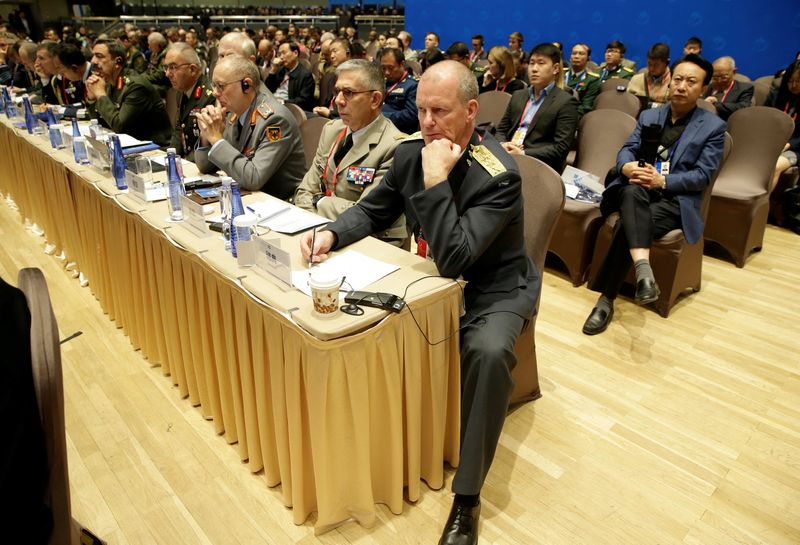By Michael Martina and Idrees Ali
WASHINGTON (Reuters) – The U.S. says it has accepted an invitation to attend China’s top annual security forum in late October, the latest sign of potentially warming ties between the two countries’ militaries.
Washington has been eager to revive military-to-military communications with China, its main strategic rival, and three sources familiar with the matter said Beijing had invited Defense Secretary Lloyd Austin to attend its Xiangshan forum, scheduled for Oct. 29 – 31.
The United States, however, won’t send Austin to the event, styled by Beijing as its answer to Singapore’s annual Shangri-La Dialogue, where in late May China’s defense minister Li Shangfu – who has since disappeared from public – declined a formal meeting with the U.S. defense secretary.
Although the invitation could be intended to counter U.S. criticism that China has been slow to rebuild military engagement after cutting most ties following then-U.S. Speaker Nancy Pelosi’s visit to Taiwan in August 2022, it may also signal a desire by Beijing to improve relations, analysts say.
U.S. officials have suggested recently there are “limited” early signs that better military communications could be restored.
The Pentagon did not say whom China had invited or who from the U.S. side would attend, and China’s embassy in Washington also declined to give details.
In a statement to Reuters, the Pentagon said it “welcomes the opportunity to engage” with representatives from China’s People’s Liberation Army (PLA) at the Xiangshan forum on ensuring open and reliable lines of communication and crisis communications channels.
“The Department responded to the PRC’s August invitation for Department officials to participate in the Beijing Xiangshan Forum with the Department’s intent to participate at a level consistent with past precedent,” it said.
In 2019, the last time the forum was held, then-U.S. Deputy Assistant Secretary of Defense for China Chad Sbragia attended, making him the most senior U.S. official to date to participate.
Before 2019, the U.S. often sent embassy defense attaches.
CHINA’S DEFENSE MINISTER
As China’s defense minister, Li typically would give a keynote speech at the forum and meet with delegations. But Reuters reported in September that he was put under investigation over corrupt procurement of military equipment.
Beijing has offered no official explanation about Li’s fate and his disappearance raises questions about how this year’s forum will be conducted.
Sbragia, who plans to attend the forum as a former official, told Reuters he received an updated invitation with an agenda that didn’t have earlier references to a speech by Li, who since 2018 has been under U.S. sanctions over Beijing’s purchase of combat aircraft and equipment from Russia. Those sanctions had been an obstacle in China’s eyes to a meeting with Austin.
China was probably aware that Austin was unlikely to attend, but it would not have extended such an invitation if it weren’t prepared for a meeting, Sbragia said.
“It probably shows that there is a significant amount of anxiety and demand that they try to reach some pattern of stable defense relations with the United States,” he said.
China has quietly issued invitations to senior U.S. officials in the past – including defense secretaries – to attend the event, held in the hills away from Beijing’s busy downtown.
Washington typically has not wanted to lend U.S. credibility to the forum by dispatching high-level delegates, a source of frustration for Beijing, which uses the conference to try to shape global discussions on defense and security issues.
China’s embassy in Washington said the forum would provide parties “an equal opportunity to express their views on advancing security cooperation” under Chinese President Xi Jinping’s Global Security Initiative, which Washington has criticized.
“China and the U.S. have been maintaining candid and effective communications through military diplomatic channels,” Chinese embassy spokesperson Liu Pengyu said.
(Reporting by Michael Martina and Idrees Ali; Editing by Don Durfee and Gerry Doyle)
